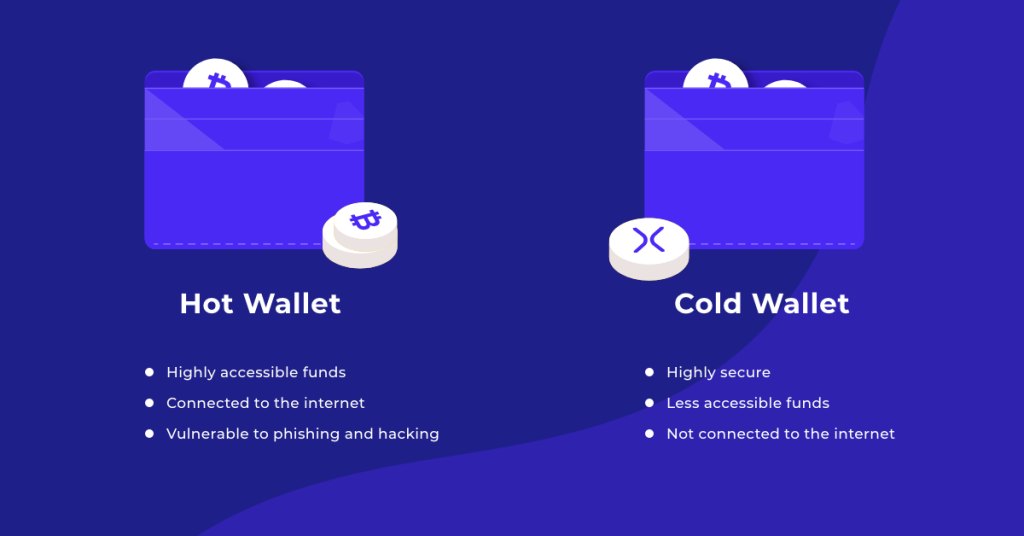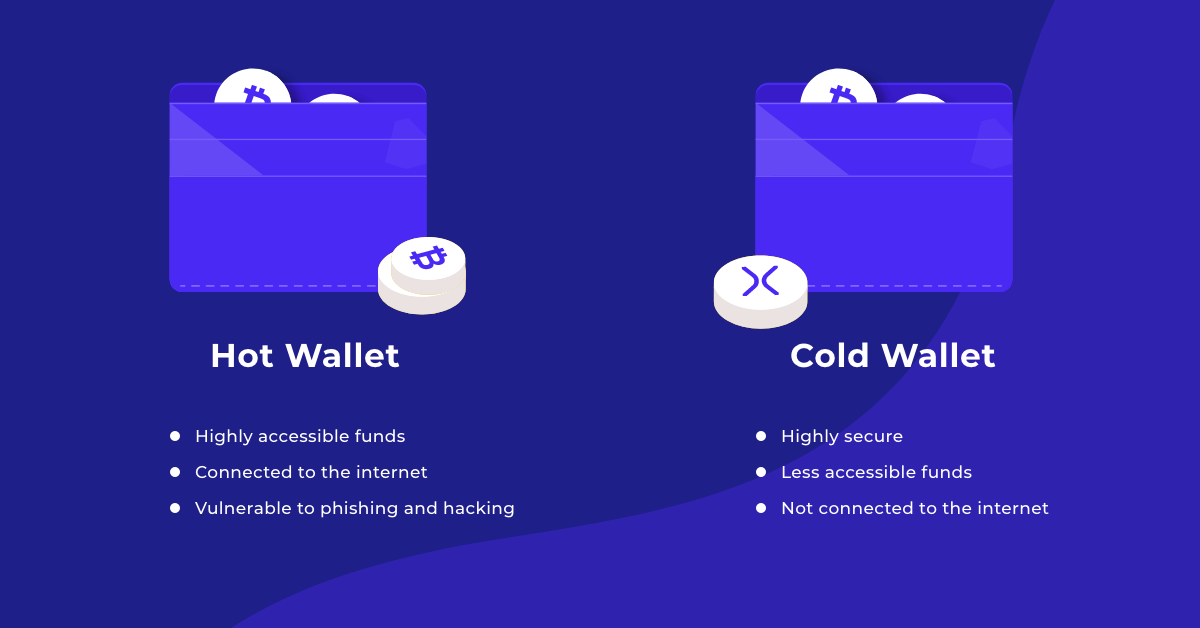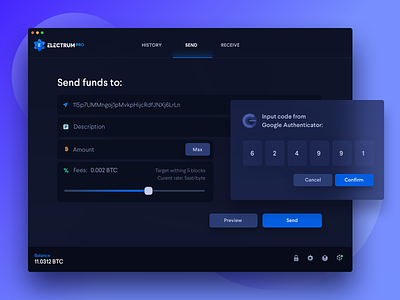As a crypto expert, I get it—securing your digital coins can fray nerves. How to choose a secure crypto wallet should not be a roll of the dice. It’s the armor for your digital gold! Whether you’re new or a crypto vet, you need a wallet that’s iron-clad. I’ve seen it all: from the ease of hot wallets to the Fort Knox vibes of cold ones; from holding your keys in non-custodial to trusting custodial services. I’m here to guide you through this maze with real talk about what keeps your coins snug. Let’s dive into the kinds of wallets, nail down top security must-haves, and sprint through advanced measures. Even more, we’ll snoop around for the most trusty wallet providers. Ready for a crypto wallet that’s a vault? Let’s go!
Understanding the Different Types of Crypto Wallets
Hot vs Cold Wallet: Features and Security
Getting a crypto wallet should be like picking a good house for your money. Picture hot wallets as your easy-access pocket for daily spending – they’re online and very user-friendly. But this ease comes with risks. Hackers love them just as much as we do. That’s why you need good locks or, for wallets, strong security tech.
On the other hand, imagine cold wallets as a safe hidden under your floorboards. They’re not connected to the internet, like a USB stick or hardware device. So, they’re like a vault for your crypto savings. Harder to break into means your coins are safer from bad guys.

hot wallet vs cold wallet
Custodial vs Non-Custodial Wallets: Controlling Your Keys
Think of cryptos as digital keys. Now, where you put these keys matters. Use a custodial wallet, and you’re letting someone else hold your keys. They’re in charge, and if they get hit by hackers, you could have a “Lost Keys” situation on your hands. That’s why some peeps might not like the idea.
In comes the non-custodial wallet. This is where you’re the keymaster. No need to rely on anyone else to keep your cryptos safe and sound. Sure, it means a bit more work for you, but it’s worth it for the peace of mind.
Remember, your coins, your keys, your call. Think of who you trust more with your digital treasure and choose wisely.
Assessing Wallet Security Features and Best Practices
Evaluating Crypto Wallets for Robust Security Protocols
When choosing a wallet, first look for secure digital wallet features. A hardware wallet offers strong protection. Hardware wallets store your coins offline. This makes them safe from online hackers.
Yet, not all hardware wallets are the same. Check each one’s specs. Choose one with a good track record. A simple Google search can tell you a lot about a product’s history of security.
Remember, software wallets can be handy, but they face more risks. They can get viruses just like a computer. So, a hardware wallet is often a better pick for security.
Now, here’s a term to know: multi-signature wallets. They need more than one key to access the coins. This is like having several locks on a door. Even if someone gets one key, they can’t get in. This feature is top-notch for security.
And, of course, keep your private keys managed well. This means, don’t share them and keep them somewhere safe. Think of private keys like your home keys. If someone takes them, they can enter your house.
Best Crypto Wallet Practices for Everyday Use
One big part of crypto wallet protection is how you use it daily. Here are some tips to keep your wallet safe:
- Always use a strong password. And don’t repeat passwords. Each account or wallet should have its own.
- Set up two-factor authentication (2FA). It’s another layer of safety. It’s like having a guard check an ID before letting someone in.
- Backup your wallet. If your computer busts, you could lose your wallet. With a backup, you can restore it.
- Be smart about phishing. Don’t click on shady links or emails. If it feels weird, it probably is.
- Keep your software up to date. New updates often fix security holes.
- Think before you use public Wi-Fi. It’s easy for crooks to sneak a peek at what you’re doing.
Don’t forget to research trusted wallet providers. Look for user reviews on their security. Good feedback from others can steer you toward a safe choice.
Also, check the wallet’s backup and recovery options. If you lose access, it’s good to know you can get back in.
Lastly, ask yourself: How does the wallet deal with threats? Some wallets insure your cryptocurrency. That means if something goes wrong, you might get your money back.
So, be sure to pick a wallet that fits your needs and keeps your crypto safe. That way, you can focus on the fun stuff, like watching your investments grow!
Advanced Security Measures for Crypto Wallets
Multi-Signature Wallets and Their Security Advantages
Let’s get real about multi-signature wallets. These wallets need more than one key to open. Think of a bank vault that needs two keys at once. This stops one person from having all the power. It’s like having a team that must agree to open the vault. That’s what makes it a strong choice for security.
Encryption and Two-Factor Authentication in Crypto Wallets
Now, let’s talk about keeping prying eyes out. Ever heard of encryption? It scrambles your wallet data so only you can read it. It’s a huge deal for crypto wallet protection. And there’s more! You’ve heard of two-factor authentication, right? It’s like a double lock on your crypto treasures. It makes sure it’s really you trying to get in.
So, now you know! Multi-signature wallets split up the access power. Encryption jumbles up your data so only you can make sense of it. And two-factor authentication adds another check to prove it’s you. Always use these to keep your coins away from the bad guys. Remember, in the world of crypto, being safe is always in style!
Performing Due Diligence Before Choosing a Wallet
Researching Trusted Wallet Providers and User Reviews
When you choose a crypto wallet, think safety first. Find providers that others trust. Read what users say about them. Look for happy or mad reviews. Good wallets have more happy users. Listen to what these folks say. They know what’s good or bad.
Learn from them. Tips? Yes, they’ve got plenty. They’ll tell you which wallets rock. And which ones? They fail hard. They’ve tested them in real fights. Their wins and losses? They can guide you. You want to keep your coins safe, right? So, do your homework. Check forums, blogs, and social media. This is where users chat and share stories.
Look for signs of strong security. Does the wallet have tough password rules? Does it offer two-step checks when you sign in? What if you lose your phone or key? Can you get your coins back safe? These things matter a lot. You don’t want to lose your hard earned coins. No way.
And so, you dig in. You search the name. You add words like “security” and “review”. What do you find? Trustworthy wallets should have clear info on how they keep coins safe. No clear answers? Red flag! Keep away. You want a wallet that fights hard to protect you. One that stands strong against hacks. Does the provider show that they fix problems swift? Do they update their software often? This counts too.
Understanding Wallet Seed Phrases and Backup Solutions
Hear this: Your wallet’s seed phrase is like a magic key. Guard it with your life. It’s a long list of words your wallet gives you. Write it down. Keep it off the net. Why? It opens doors to your coins. Only you should hold this key. No one else. This phrase lets you or someone you trust get back your coins if things go bad.
See, wallets can break. Phones get lost. Computers crash. But with your seed phrase safe, you’re okay. You can bring back your wallet on a new device. Just with those words. It’s like a safety net for your virtual cash.
What about making a copy? Good idea but be smart. Don’t just leave it anywhere. Hide it well. Maybe in a safe or with someone you really trust. It’s not just about making a copy. It’s about keeping it safe but getable when you need it.
If your wallet asks for a seed phrase backup, say yes. Always. But do backups right. Use paper, not digital. Hackers can’t steal what’s not online, right? And check this – some wallets let you split your seed phrase. Store parts in different places. It’s more work but safer.
Do these things before you say yes to a wallet. Your coins thank you. Your future self does too. Remember, being safe beats being sorry, anytime.
In this post, we’ve explored the crypto wallet landscape, from hot and cold wallets to custodial and non-custodial options. We’ve looked at what makes each unique and how they can impact security and control over your assets. We’ve also delved into what security features to look for and the best habits to keep your crypto safe, emphasizing the importance of robust security protocols and smart daily practices.
We dived deeper with advanced measures like multi-signature wallets and tech tools such as encryption and two-factor authentication to fortify your crypto fortress. Lastly, we’ve seen how essential it is to do your homework before picking a wallet, checking out providers, and understanding the value of seed phrases and backups.
My final take: picking the right wallet boils down to understanding your needs and balancing them with the best security. Always stay informed, practice safe wallet habits, and remember: the power to protect your crypto is in your hands. Choose wisely, stay alert, and keep learning. Your digital treasure deserves no less. Follow Dynamic Cryto network to update more knowledge about Crypto.
Q&A :
What factors should I consider when selecting a secure cryptocurrency wallet?
When choosing a secure crypto wallet, you should consider several key factors to safeguard your digital assets effectively. These include the type of wallet (hardware, software, or paper), the security features it offers (like two-factor authentication and multi-signature options), the reputation and track record of the wallet provider, ease of use, and whether it supports the cryptocurrencies you’re interested in holding. Additionally, ongoing customer support and the wallet’s backup and recovery methods are crucial in the event of device loss or failure.
How do I know if a crypto wallet is secure?
To determine the security of a crypto wallet, you should look for features such as advanced encryption methods to protect private keys, regular security audits by reputable firms, transparent open-source code, and active development with frequent updates and patches. It’s also worth checking online reviews and forums for user experiences and any reported security incidents. Furthermore, a secure wallet should offer educational resources to teach safe storage practices.
Are hardware wallets more secure than software wallets?
Hardware wallets are generally considered more secure than software wallets, also known as hot wallets, due to their ability to store private keys offline in a physical device. This makes them less vulnerable to online hacking attempts and malware. Meanwhile, software wallets are more convenient for daily use but are always connected to the internet, posing a higher risk for potential security breaches. However, using reputable software wallets with robust security measures can still be a safe option for users.
Can a crypto wallet be hacked?
Yes, a crypto wallet can be hacked if proper security measures aren’t in place or if the user falls victim to phishing, malware, or other types of cyberattacks. To minimize the risks, it is crucial to use wallets from trustworthy providers with strong security features, to keep software up to date, and to never share private keys or recovery phrases with anyone. Additionally, enable all available security features such as two-factor authentication and avoid using unsecured internet connections while accessing your wallet.
What is the best way to backup a crypto wallet?
The best way to backup a crypto wallet is by writing down the wallet’s recovery phrase, often called a seed phrase, and storing it in a secure location that only you can access. It’s advisable to have more than one copy kept in separate and secure places to guard against accidental loss or damage. For added security, consider using a physical form of storage such as a metal backup device that’s fireproof and waterproof. Always refrain from storing your recovery phrase electronically or online to prevent unauthorized access.


